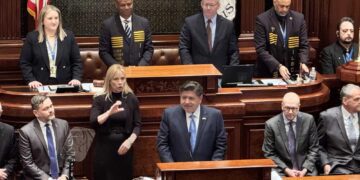SPRINGFIELD – Mandatory voter registration based on drivers' license applications is making its way through the Illinois legislature – to the delight of prominent Left-leaning organizations.
Saturday, Rainbow PUSH Coalition's Jesse Jackson urged the bill's passage in the Illinois legislature, saying said "We need to pass Automatic Voter Registration to register up to 2 million people."
After unanimous, bipartisan support in the Illinois Senate last week, Democrat State Rep. Robyn Gabel of Evanston and Rob Martwick of Chicago signed on Monday to shepherd SB 1933 through the Illinois House.
The bill would make Illinois the first state with AVR in multiple agencies, Trevor Gervais, the lead organizer for Common Cause Illinois and a former Get Out The Vote director for Obama 2012, told the Rainbow PUSH audience.
Leftist action groups such as Gervais, Common Cause Illinois, Democracy Illinois, Democracy Awakening, SEIU and the Illinois Coalition for Immigrant and Refugee Rights celebrated the bill's passage on Twitter with #AVRinIL right after the bill passed the Illinois Senate.
After Governor Rauner vetoed similar legislation last year, his office is reportedly now encouraging Republican lawmakers to sign on after changes were made to the legislation.
But not everyone is so convinced that tying voter registration to state driving privileges is a good way to go. The conservative think tank Heritage Foundation is concerned that creating a dual purpose form to register voters and validate drivers could result in "the registration of large numbers of ineligible voters as well as multiple or duplicate registrations of the same individuals."
"When combined with the accompanying proposal that states allow any individuals who are not automatically registered to register and vote on Election Day, MVR presents a sure formula for registration and voter fraud that could damage the integrity of elections," a report authored by Heritage Foundation fellow Hans von Spakovsky says.
"Automatically registering individuals to vote without their permission would also violate their basic right to choose whether they wish to participate in the U.S. political process," von Spakovsky writes. "Indeed, this new scheme threatens one of American’s most cherished liberties: the freedom to be left alone by the government."
Canada has had a similar system in place for years, and the system did not result in a notable upsurge in registrations or voter participation. In addition, the problems such a system would create include:
First, many government databases may lack a signature, which is required for voter registration and essential for verifying both petitions for candidates and ballot initiatives, as well as requests for absentee ballots and voted absentee ballots that are received by election officials.
Second, using government databases such as “motor vehicle departments, income tax authorities, and social service agencies,” as recommended by the Brennan Center, would fail to differentiate citizens from non-citizens. All states, for example, provide driver’s licenses to aliens who are legally in the United States, and several states provide driver’s licenses to illegal aliens. Many individuals who reside in the United States but are not citizens also file tax returns, which would allow individuals who filed with “income tax authorities” the ability to register to vote. It would also lead to duplicate and multiple registrations of individuals listed on different government databases, such as individuals who own property or pay taxes in more than one state.
While no group opposing the effort made public their concerns after the Senate's vote, questions were raised as to whether the driver's license applicant will be required to declare his or her intent to register, swear as to his or her age, address and citizenship.
Currently, for an applicant to lie when asked those questions about voting qualification is potentially punishable as perjury.
The governor's office has been asked twice about the changes that were made that constitute his change in position on the bill. They have yet to reply.







